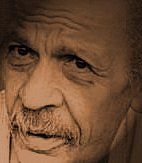Ahmed Fouad Negm
| Ahmed Fouad Negm | |
|---|---|

Ahmed Fouad Negm
|
|
| Background information | |
| Also known as | Ahmed Negm |
| Born |
22 May 1929 Sharqia, Egypt |
| Died | 3 December 2013 (aged 84) Cairo, Egypt |
| Genres | Egyptian music |
| Occupation(s) | Vernacular poet |
| Instruments | Vocals, Oud |
Ahmed Fouad Negm (Arabic: أحمد فؤاد نجم, pronounced [ˈæħmæd foˈʔæːd ˈneɡm]; 22 May 1929 – 3 December 2013), popularly known as el-Fagommi الفاجومي ([elfæˈɡuːmi]), was an Egyptian vernacular poet. Negm is well known for his work with Egyptian composer Sheikh Imam, as well as his patriotic and revolutionary Egyptian Arabic poetry. Negm has been regarded as "a bit of a folk hero in Egypt."
Ahmed Fouad Negm was born in Sharqia, Egypt, to a family of fellahin. His mother, Hanem Morsi Negm, was a housewife, and his father Mohammed Ezat Negm, a police officer. Negm was one of seventeen brothers. Like many poets and writers of his generation, he received his education at the religious Kutaab schools managed by El-Azhar.
When his father died, he went to live with his uncle Hussein in Zagazig, but was placed in an orphanage in 1936 where he first met famous singer Abdel Halim Hafez. In 1945, at the age of 17, he left the orphanage and returned to his village to work as a shepherd. Later, he moved to Cairo to live with his brother who eventually kicked him out only to return to his village again to work in one of the English camps while helping with guerilla operations.
After the agreement between Egypt and Britain, the Egyptian National Workers’ Movement asked everyone in the English camps to quit their job. Negm was then appointed by the Egyptian government as a laborer in mechanical workshops. He was imprisoned for 3 years for counterfeiting form, during which he participated and won first place in a writing competition organized by the Supreme Council for the Arts. He then published his first collection “Pictures from Life and Prison” in vernacular Egyptian Arabic and became famous after Suhair El-Alamawi introduced his book while he was still in prison. After he was released, he was appointed as a clerk in the organization for Asian and African peoples. He also became a regular poet on Egyptian radio.
...
Wikipedia
